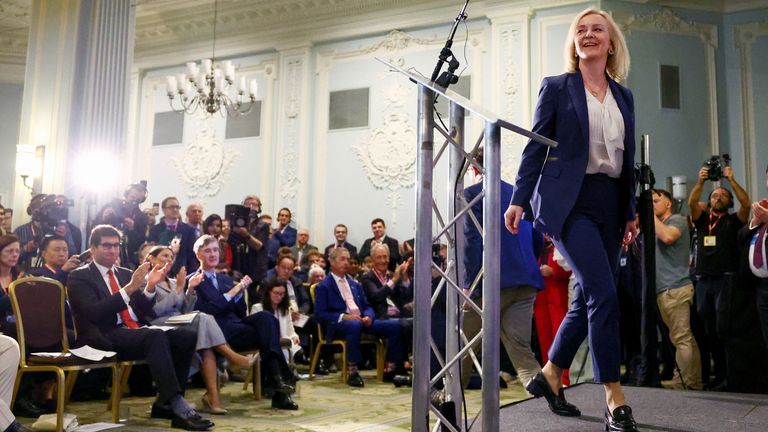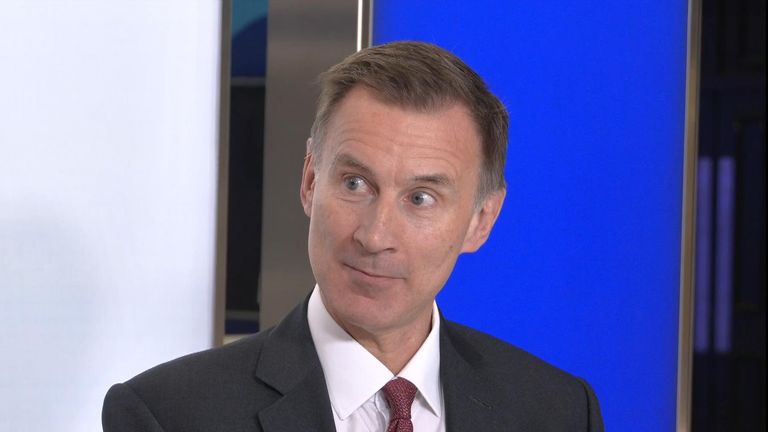Hunt vs Truss: At the heart of the Tory tax divide is a disagreement on how economies work | Politics News
The chancellor’s speech usually sets the agenda at a party onference but Jeremy Hunt was playing catch up today.
He’s struggling to be heard above the clamour within his party for tax cuts. Today he attempted to regain control of the narrative: chiefly that bringing down inflation is the “best tax cut” the government can give to the public.
“We’re getting there… the plan is working and now we must see it through just as Margaret Thatcher did many years ago.”
It was a rebuke to members of his own party as much as it was to Labour.
Just hours earlier, the former prime minister, Liz Truss, was leading the charge on the issue.
Speaking at a packed fringe event, she said that tax cuts were the key to making the Tories “the party of business again” and to unlocking economic growth.
She urged the government to cut corporation tax to 19% at the Autumn Statement.
The chancellor said it was easy to support a high growth and low tax economy but “harder to make it happen”.
At the centre of this is a disagreement over how economies work.
Hunt and Sunak fear that a wave of tax cuts could worsen the inflationary problem because it would give people more money to spend.
Higher inflation will trigger even higher debt servicing costs on government debt – a quarter of the national debt is index linked, meaning it goes up with inflation.
By keeping inflation, and debt servicing costs down, the government hopes it can find space for tax cuts ahead of the election – while still meeting the fiscal rules – but any offering will be muted compared to the size of the tax cuts demanded from some in his party.
The Truss camp believes that tax cuts are the key to unlocking growth. Combined with supply side reforms that grow the productive capacity of the economy, Britain can overcome economic stagnation.
Opponents will remind Truss that her strategy in the form of the mini budget led to a meltdown in the financial markets. Weary of the inflationary consequences, investors did not take kindly to the prospect of unfunded tax cuts.
However, Tory MPs are not taking kindly to the chancellor’s apparent lack of alternative strategy for growth.
Mr Hunt is sensitive to the call for tax cuts. His party has been riled up by a report of from the Institute of Fiscal Studies, which said that the tax burden had reached its highest level since records began 70 years ago and the country was experiencing a “permanent shift” towards a high tax economy.
For many Tories that is simply unacceptable. The Chancellor does want to find space for tax cuts ahead of the election but is constrained by the public finances. He warned against the consequences of increasing borrowing to pay for them, warning that increasing borrowing and raising the debt was an “economic illusion”.
Instead, like Truss, he wants to increase productivity (although he doesn’t believe immediate tax cuts are the way to achieve that.) If Britain is able to produce more with the same resources, that will allow us to grow without fuelling inflation and, in turn, increase the tax intake and meet our spending commitments.
This, economists agree, is the key to unlocking long term prosperity. Hunt said: “The IFS is wrong, we need a more productive state, not a bigger state.”
Yet, he was short on ideas for how to address the productivity woes that have been plaguing this country since the financial crisis over a decade ago, and probably failed to outline a vision that could convince the tax cutting Trussites.
He said his deputy, John Glen, would investigate the issue, and put forward some suggestions: such as freezing the expansion of the civil service. It’s more of a cost saving idea than a productivity boosting one: the chancellor said it would save the country £1 billion next year.
He is also looking to reduce the benefits bill by bolstering the sanctions regime. In doing so he hopes to address the rise in economic inactivity since the pandemic, whereby hundreds of thousands of people dropped out of the labour market and never returned.
That’s bad for productivity and – because it exacerbates staff shortages-bad for inflation.
Read more:
Three main points from Hunt’s conference speech | Ed Conway
When could the next general election be?
Politics at Jack and Sam’s: The Week… of the Conservative Party conference
Hunt said: “Since the pandemic, things have been going in the wrong direction. Whilst companies struggle to find workers, around 100,000 people are leaving the labour force every year for a life on benefits. As part of that, we will look at the way the sanctions regime works. It is a fundamental matter of fairness. Those who won’t even look for work do not deserve the same benefits as people trying hard to do the right thing.”
It was hardly a coherent vision for economic growth, and probably explains why the chancellor engaged in a bit of revisionism.
He stressed that the Office for National Statistics had reassessed the numbers and that Britain was no longer the worst performing economy since the pandemic and that it had, in fact, outperformed Germany and France.
“So to all the pessimists…don’t bet against Britain”, the chancellor said. A rallying cry but it doesn’t change the fact that the country has experienced negligible economic growth over the last two years.





